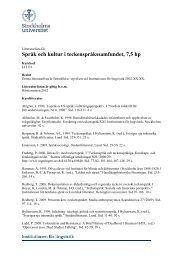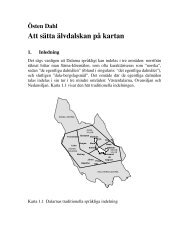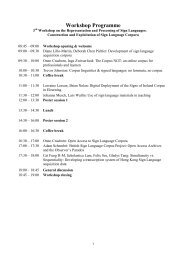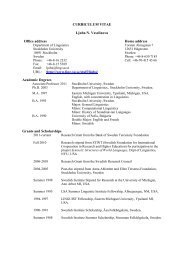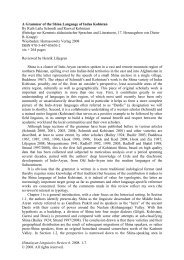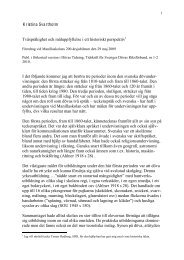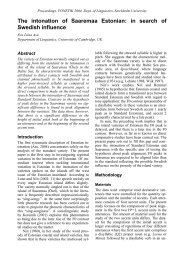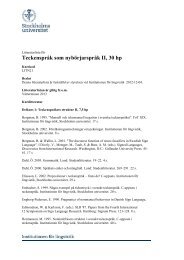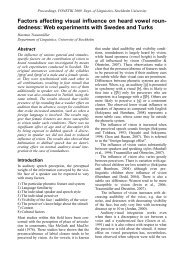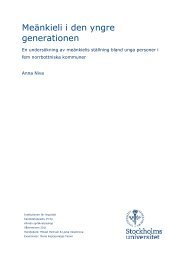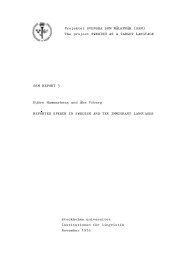Proceedings Fonetik 2009 - Institutionen för lingvistik
Proceedings Fonetik 2009 - Institutionen för lingvistik
Proceedings Fonetik 2009 - Institutionen för lingvistik
Create successful ePaper yourself
Turn your PDF publications into a flip-book with our unique Google optimized e-Paper software.
<strong>Proceedings</strong>, FONETIK <strong>2009</strong>, Dept. of Linguistics, Stockholm UniversityLVA-technology – The illusion of “lie detection” 1Francisco LacerdaDepartment of Linguistics, Stockholm UniversityAbstractThe new speech-based lie-detection LVAtechnologyis being used in some countries toscreen applicants, passengers or customers inareas like security, medicine, technology andrisk management (anti-fraud). However, a scientificevaluation of this technology and of theprinciples on which it relies indicates, not surprisingly,that it is neither valid nor reliable.This article presents a scientific analysis of thisLVA-technology and demonstrates that it simplycannot work.IntroductionAfter of the attacks of September 11, 2001, thedemand for security technology was considerably(and understandably) boosted. Among thesecurity solutions emerging in this context,Nemesysco Company’s applications claim to becapable of determining a speaker’s mental statefrom the analysis of samples of his or her voice.In popular terms Nemesysco’s devices can begenerally described as “lie-detectors”, presumablycapable of detecting lies using shortsamples of an individual’s recorded or on-linecaptured speech. However Nemesysco claimstheir products can do much more than this.Their products are supposed to provide a wholerange of descriptors of the speaker’s emotionalstatus, such as exaggeration, excitement and“outsmarting” using a new “method for detectingemotional status of an individual”, throughthe analysis of samples of her speech. The keycomponent is Nemesysco’s patented LVAtechnology(Liberman, 2003). The technologyis presented as unique and applicable in areassuch as security, medicine, technology and riskmanagement (anti-fraud). Given the consequencesthat applications in these areas mayhave for the lives of screened individuals, a scientificassessment of this LVA-technologyshould be in the public’s and authorities’ interest.Nemesysco’s claimsAccording to Nemesysco’s web site, “LVAidentifies various types of stress, cognitiveprocesses and emotional reactions which togethercomprise the “emotional signature” of anindividual at a given moment, based solely onthe properties of his or her voice” i . Indeed,“LVA is Nemesysco's core technology adaptedto meet the needs of various security-relatedactivities, such as formal police investigations,security clearances, secured area access control,intelligence source questioning, and hostagenegotiation” ii and “(LVA) uses a patented andunique technology to detect ‘brain activitytraces’ using the voice as a medium. By utilizinga wide range spectrum analysis to detectminute involuntary changes in the speech waveformitself, LVA can detect anomalies in brainactivity and classify them in terms of stress, excitement,deception, and varying emotionalstates, accordingly”. Since the principles andthe code used in the technology are described inthe publicly available US 6,638,217 B1 patent,a detailed study of the method was possible andits main conclusions are reported here.Deriving the “emotional signature”from a speech signalWhile assessing a person’s mental state usingthe linguistic information provided by thespeaker (essentially by listening and interpretingthe person’s own description of her or hisstate of mind) might, in principle, be possible ifbased on an advanced speech recognition system,Nemesysco’s claim that the LVAtechnologycan derive "mental state" informationfrom “minute involuntary changes in thespeech waveform itself” is at least astonishingfrom both a phonetic and a general scientificperspective. How the technology accomplishesthis is however rather unclear. No useful infor-1 This text is a modified version of Lacerda (<strong>2009</strong>), “LVA-technology – A short analysis of a lie”, available online athttp://blogs.su.se/frasse/, and is intended for a general educated but not specialized audience.220




